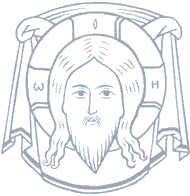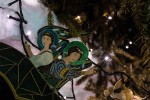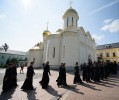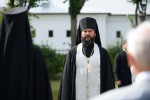 |

|
||||||||||||||||
Ты Бог мой! Музыкальное наследие священномученика митрополита Серафима Чичагова
[Автор-составитель: О. И. Павлова; Автор-составитель: В. А. Левушкин]
07 сен. 2016 г. Физическое и духовное здоровье: по "Медицинским беседам" Леонида Михайловича Чичагова
[сщмч. Серафим (Чичагов)]
10 мая. 2016 г. |
Archbishop Ambrose. Contemporary theology
09 октября 2018 г.
First of all, I would like to thank you for the invitation to participate in the meeting of the Nobility Assembly and to speak about my reflections on contemporary theology. It is a great honor for me to be among you. My thoughts will be a little non-systematic, because what I’m going to talk about is generally non-systematic, like love, grace, and knowledge of God. This is not so much a report, but simply my personal reflections as a priest and rector, first of the Saint Petersburg, and now of the Moscow Theological Academies – the largest theological educational institutions of our country. In general, in my opinion, the word “theology” does not need the addition of “contemporary”. Theology must be contemporary without any special indication. Theology is a way of thinking, a state of mind, a quality of life, which determines the actions and attitudes of the theologian towards something or someone. And in this sense, theology cannot be not contemporary. Theology is daily. Theology is what is present, here and now. Theology is first and foremost a way of life. It helps to discover God. But God cannot be understood by scientific methods. He is discovered by every person who wants it at the moment of the present. And references to ancient theology, or to the 4th century theology, for example, and its comparison with the “contemporary” theology is more a conversation about doctrines, theological schools, opinions of various theologians. These are theological disciplines, but not theology itself, as a process. Theology is not so much a scientific discipline as a practical, effective and even experimental discipline. In the sense that God is not the same for everyone and opens in an experience that is not similar to the experience of other people. I emphasize precisely this side of theology – the personal side, mystical, not subject to the scientific method. Because theology as a science is divided into a large number of disciplines, and more importance is often given to the intellectual meaning, rather than spiritual. Theology is a practice. And it is precisely for this reason that in Antiquity and in the Middle Ages theology was considered the basis of other knowledge and sciences, since it gave a person a special life skill and point of view, allowing him to look at the universe in a special way. The theologians interpreted everything that exists around them, from the position of a believer, with the understanding that the world was created and maintained by the Creator. Life as a bundle of the Divine and human, the union of the mysterious and at the same time natural – this is the subject of reflections of the theologian. And not just of the reflections, I repeat, but of life itself in all trifles: everything is understood, given that the universe was created and supported by the Creator. Theology is the practice of contemplation, deepening into ones inner content. The practice of stopping the fuss and trying to consider the eternity, God, to look at oneself beyond the fluidity of the existence. In this sense, theology of course is not a science and it stands apart from the sciences, because it has a different method. Due to this, theology was above scientific disciplines, giving them a special meaning and divine depth. Nowadays things are different. Theology has become one of the humanitarian sciences, and far from being the most important in the context of contemporary humanitarian knowledge. The humanities are not perceived as useful for technical progress and economic development, the role of which has been brought to the fore in the modern picture of the world. Modern education and modern science is the accumulation and transmission of the experimentally confirmed facts. Theology does not work with facts that can be proved experimentally. The work with the facts somewhat simplifies the picture of the world, reducing everything to a set of postulates and not giving space for things inexplicable, mystical, complex and visually absent. Theology cannot simplify the world, because the idea of an incomprehensible God cannot be simple. But it’s not so much the secondary role of theology in relation to the sciences that bring economic profit. Much more important is that at the theological educational institutions, seminaries, academies and theological faculties the theological and semi-theological disciplines are taught separately, most often quite fragmentary, and most important – very often without reference to specific experience, without purposeful theological practice. It is as if future artists in art schools were taught not to draw, but would be studying the ancient interpretations of the ancient drawings. Would study the history of the development of artistic creativity. They would talk about different schools, and which ones are more correct and which ones are less. But would not learn to draw. Or would leave drawing for an optional training, for those who want to. Such analogies can be made with any practically-oriented educational institution: sports, music, military. There are lots of reasons for this state of affairs and in my opinion one of the most important is the use of the scientific method, its application where practice is necessary, and not only and not so much theorization. It did not appear now, and I do not in any way criticize the scientific method, which has given many wonderful fruits to the modern world. I want to talk about something else. In theology, the practice of contemplative life is important; it is its basis. Theology must comprehend the present. It always has. Sometimes it seems to me that our theology today comes down to reflections on how it was. But theology at all times comprehended the contemporary picture of the world: physics (cosmology), natural sciences, culture, social life. Theology is not an entanglement or an embarrassment of human’s life. Although it may seem so if you start reading a theological treatise or a textbook on any theological discipline. Theology, in my opinion, is not scholastics, not an attempt to sort through all the incredible complexity of both the created world and the uncreated, eternal, incomprehensible God and His relationship with us, the people He created. Theology, first of all, is mystery. That is something that cannot be unified, objectified or somehow explained. One can only feel it, point the way, most often, an approximate one, but still capable of helping a person to go towards God. We all understand that there are no general rules that will suit all the people. We are too different, with a different feeling of our own freedom, we are inspired by different things. This is how the Lord has created us, and He certainly knows that we are so different from each other. I think He does not want us to live the same way, write the same texts, say the same words, dress the same clothes and eat the same food. So, theology should help a person understand that everything is more complicated than just a set of rules and regulations. Jesus Christ spoke about this in the Gospel. A young man came to Him, he followed all the rules prescribed to his people. Never broke any of it. But he felt that this was not all that he was living for. And the Lord offered him something deeply personal, something which touched him. He offered him a thing that seemed to go contrary to the rules of his people – “sell your possessions and give to the poor and follow me”. He was rich, says the evangelist. And we know that wealth was then considered a blessing of God, a special favor of the Lord to person. And we see that the Lord really touched his heart. But He left freedom of choice for the young man, without giving categorical recommendations, but “if you want to be perfect...” (Mt 19:21). Leaving the freedom of choice for a person is exactly how God acts in the world. And this episode of the Gospel tells us that everything is more complicated than the observance of regulations and rules. Often formal descriptions, researches, classification of terms, texts and artifacts are associated with theology. But this is not theology at all. These are formal, external things that in no way reflect the depths, mysteriousness, inner strength not only of God, but also of any saint, of any important spiritual event. But theology is in deep inner content, not in external signs. Specific theological disciplines are of course important, they help, but they’re walking around. What is inside this circle is only comprehended by a mystical connection with the Creator: prayer, communion, contemplation. And of course, the central and most contemporary theme of theology as a life is communion. Union with God through the acceptance of His Body and Blood is the very contemporary theology, the mystical theology embodied in life. Genuine theology is based on love. Genuine theology is emotional, not objective, unpredictable, because it is connected with an incomprehensible God. Theology is not a system of knowledge or logical constructions. Theology cannot create theories. Theology is unpredictable because it is not subject to determinism or any logic. However, today theology means precisely theorization, most often, devoid of any content, theorization for the sake of the process itself. If we talk about theological education, in particular, about the education of future clergy, then this of course first and foremost should be a good modern humanitarian education. Plus some specific disciplines. Our culture, European culture, is based on Christianity. Therefore, theological education is primarily a cultural education. It is necessary to place the student in the context so that he can understand what is happening in the cultural and social environment, and why this is happening this way. But this is only the first step. One can study what is around theology for an infinitely long time, since the humanities have no visible limits at all. But even becoming an impeccable expert in theological and semi-theological sciences a person will not become a theologian more than any other humanitarian scientist. But without a humanitarian background, through mystical experience alone, it is impossible to become a theologian, at least one that can express inexpressible things in a language that is understandable to the modern educated person. Theology should bring a person closer to the state that God intended for him: theology is what makes a person free, happy, full of love. No other science, humanitarian, exact, and even ecclesiastical or theological can do these things. The change of life and attitude occurs not in the theoretical sphere, but in the practice of daily life. Theology is always contemporary if it is exercised by the theologian. If the theologian is contemporary, he will certainly begin to work through new theological issues. As an example, I can name the contemporary theologian Archpriest Václav Ježek who reflects on and writes about the theology of emotions, about which either have not been written before, or have been written so little and in the context of other topics. Every person is called to be a theologian. Due to various circumstances, this is not the case now. And, most likely, will never be. But the at least those people who others see as spiritual guides should be theologians. These are priests, bishops, preachers, people of the Church. And the education of theologians of course must take place in theological schools – seminaries and academies. Education today, and, unfortunately, theological education is not an exception, is a transmission of facts. But the facts themselves have nothing to do with theology. At times, education loses the spirit of personal interaction and the spirit of community, which are the basis of theological progress. This is justified economically, justified from the point of view of the management of the educational institution. And this is good, most likely, for any education, except the theological one. Because theological education is first and foremost upbringing, self-education. This is more pedagogy than factology. Therefore, an educational institution that can provide a theological education has to face the costs of another plan. We cannot be a conveyor production. The theologian is always a personality, uniqueness, which means that a personal approach is needed. Contemporary theology should become the life and conscious of the Church, and not just a set of intellectual abstractions, even if they are logically verified. Contemporary theology should be pastoral in the sense of understanding the specific problems of living people, leading the person of today to God, being a guide, while really knowing the right path. I like the words of Metropolitan Anthony of Sourozh addressed to the clergy: “Yes, you’ve received an education in a theological school, be it a seminary, be it an academy, but still this intellectual education could not make you holy; do not imagine that you can lead people from Earth to Heaven... You know, when people take a guide to the mountains, they choose a person who has been there, knows the road, has already passed through it. And a priest, especially a young one, who says: "I’ve received a complete theological education, I can take a man by the hand and bring him into the kingdom of God" – is wrong, because he has never been there”. Contemporary theology should be mystical, i.e. it should deliver to humanity the knowledge of the Living God through prayer and the sacraments, through participation in the Eucharistic life of the Church. Contemporary theology must be practical, i.e. it should speak about God and salvation not only by words and texts. The theologian should fill his whole life with the content of eternal life. Contemporary theology should be an explanation of the salvific experience of the Church, an explanation of the events that became the foundation of our faith – I mean the incarnation, life, suffering, death and resurrection of our Lord Jesus Christ. Explaining the meaning of these events for a person living in the modern world, surrounded by a completely different context, filled with almost completely different meanings than those that humanity lived during the times of the Savior and the Great Fathers. And most importantly, contemporary theology should be liturgical. In a world where many phenomena are treated as services, including the Church, which should “serve” the spiritual needs of a person, contemporary theology should speak of a divine mission, of a great gift of communion with Divine mysteries, of the communion of the Holy Spirit, of the mysterious communion of the theandric body of the Church through the Eucharist – acceptance the Body and Blood of our Lord and Savior Jesus Christ. // Lecture of the Rector of the Moscow Theological Academy, Archbishop Ambrose of Vereya, at the meeting of the Assembly of the Nobility on October 9, 2018
|
15 февраля 2019 г.
15 февраля, в двунадесятый праздник Сретения Господня, архиепископ Амвросий совершил Божественную литургию в семинарском храме преподобного Иоанна Лествичника. На праздничном богослужении владыка ректор рукоположил студента МДА и сотрудника Учебного комитета чтеца Иоанна Захарова в сан диакона.
15 февраля 2019 г.
Издательство МДА представляет первый номер нового научного журнала Московской духовной академии «Праксис». Журнал объединяет публикации, соответствующие паспортам научных специальностей ВАК 26.00.00 (Теология) и 12.00.01 (Теория и история права и государства; история учений о праве и государстве), и охватывает такие предметы, как каноническое право, литургика, пасторология, юридические науки, педагогика и т. д.
14 февраля 2019 г.
13 февраля 2019 года в Отделе внешних церковных связей состоялось заседание Межведомственной координационной группы по преподаванию теологии в вузах. В заседании принял участие ректор Московской духовной академии архиепископ Верейский Амвросий.
13 февраля 2019 г.
12 февраля в Большом актовом зале Московской духовной академии состоялась премьера фильма «Чудотворец» с презентацией профессора ВГИКа Станислава Михайловича Соколова, режиссера-постановщика картины.
Архиепископ Верейский Амвросий (Ермаков) [Статья]
Архиепископ Верейский Амвросий (Ермаков) [Статья]
Игумен Пантелеимон (Бердников) [Проповедь]
Чтец Сергий Палий [Проповедь]
Чтец Андрей Мачак [Проповедь]
|
|||||||||||||||||||||||||||||||||||||||||||||||||||||||||||||||||||||||||||||||||||||||||||||||||||||||||||||||||||||||||||||||||||||||||||||||||||||||||||||||||||||||||||||||||||||||||||||||||||||||||||||||||||||||||||||||||||||||||||||||||||||||||||||






